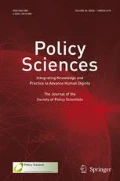Abstract
It is widely assumed that stakeholder participation has great potential to improve the perceived legitimacy of natural resource management (NRM) and that the deliberative-democratic qualities of participatory procedures are central to the prospects of success. However, attempts to measure the actual effects of deliberation on the perceived legitimacy of participatory NRM are rare. This article examines the links between deliberation and legitimacy in participatory NRM empirically by tracing the determinants of stakeholders’ level of policy support and their views about procedural fairness. The study uses statistical methods to analyse survey data from a state-led initiative to develop new plans for ecosystem-based coastal and marine management through a participatory approach in five coastal areas in Sweden. We find that the perceived quality of deliberation had a positive impact on these aspects of legitimacy. However, both policy support and perceived procedural fairness were mainly driven by instrumental-substantive considerations rather than deliberative-democratic qualities of the process.

Similar content being viewed by others
Notes
For example, “collaborative” public management (or co-governance) (Fung 2006; Ansell and Gash 2008), has been defined as a context of stakeholder participation where “one or more public agencies directly engage non-state stakeholders in a collective decision-making process that is formal, consensus-oriented, and deliberative…” (Ansell and Gash 2008, 544; cf. Choi and Robertson 2014, 495).
The Swedish formulation used in the survey to capture this aspect of legitimacy is “Jag ställer mig bakom” (“I stand behind”). Responding affirmatively to this implies an explicit commitment to the result of the participatory process (i.e. it is stronger than simply “being in favour of”). This is, of course, fully consistent with having personal views that may deviate considerably from the collectively agreed content of plan, just as we may fully recognize the moral validity of a hard-won compromise or wholeheartedly accept the winner of a fair election even when we voted for a different candidate.
This emphasis of our study leaves out whether these practices may also be perceived as legitimate by non-participants (Jentoft 2000, 145). More fundamentally, it also means that the study remains silent on normative conceptions of legitimacy, i.e. on when and why we “have good reasons to support or obey” a public policy or decision (Fung 2006, 70; cf. Beetham 2013; Pettit 2012). We are not, then, trying to establish whether (or how well) the participatory approach under study satisfied any particular normative standard of legitimacy, deliberative or not.
Learning is also often treated as an important aim in itself. With this in mind, we should stress that our focus on the possible role of learning-related variables to serve the ends of perceived legitimacy is not to imply that such goals of social learning and better informed decisions are less important than perceived legitimacy, or to deny that they may also be very important objectives in their own right.
The terms of “an ecosystem-approach”, “ecosystem management” and “ecosystem-based management” are not identical and different meanings have been attached to each of these terms. For our present purposes, however, we shall leave such differences aside and use them interchangeably. What matters here is that they can all be analysed as part of the same general discourse (introduced below) in which the emphasis on stakeholder participation is a key component.
It should be pointed out that all respondents have, as a prerequisite for taking part in the survey, participated in the process. Thus, answering “uncertain” represents uncertainty in terms of agreeing/disagreeing with the question statement, and not uncertainty as a result of not being part of the process.
Indeed, our results from a parallel study, presenting a content analysis of the five management plans, suggest that central parts of the plans were quite generally formulated, and that difficult trade-offs between opposing values, and divergent stakeholder interests were often avoided (Borgström et al. 2015; see also Sandström et al. 2015).
References
Ansell, C., & Gash, A. (2008). Collaborative governance in theory and practice. Journal of Public Administration Research and Theory, 18(4), 543–571.
Armitage, D., Plummer, R., Berkes, F., Arthur, R. I., Charles, A., Davidson-Hunt, I., & Diduck, A. (2009). Adaptive co-management for social-ecological complexity. Frontiers in Ecology and the Environment, 7(2), 95–102.
Bäckstrand, K., Khan, J., Kronsell, A., & Lövbrand, E. (Eds.). (2010). Environmental politics and deliberative democracy: Examining the promise of new modes of governance. Cheltenham: Edward Elgar.
Beetham, D. (2013). The legitimation of power (2nd ed.). Basingstoke: Palgrave Macmillan.
Borgström, S., Bodin, Ö., Sandström, A., & Crona, B. (2015). Developing an analytical framework for assessing progress toward ecosystem-based management. Ambio, 44(3), 357–369.
Carlsson, L., & Berkes, F. (2005). Co-management: Concepts and methodological implications. Journal of Environmental Management, 75(1), 65–76.
Choi, T., & Robertson, P. J. (2014). Deliberation and decision in collaborative governance: A simulation of approaches to mitigate power imbalance. Journal of Public Administration Research and Theory, 24(2), 495–518.
Christensen, N. L., Bartuska, A. M., Brown, J. H., Carpenter, S. R., D’Antonio, C., Francis, R., et al. (1996). The report of the ecological society of America committee on the scientific basis for ecosystem management. Ecological Applications, 6(3), 665–691.
Coglianese, C. (1999). The limits of consensus. Environment, 41(3), 28–33.
Cortner, H. J., & Moote, M. A. (1999). The politics of ecosystem management. Washington, DC: Island Press.
Dryzek, J. (2010). Foundations and frontiers of deliberative governance. Oxford: Oxford University Press.
Dryzek, J., & List, C. (2003). Social choice theory and deliberative democracy: A reconciliation. British Journal of Political Science, 33(1), 1–28.
Elster, J. (1986). The market and the forum: Three varieties of political theory. In J. Elster & A. H. Hylland (Eds.), Foundations of social choice theory (pp. 103–132). Cambridge: Cambridge University Press.
Elster, J. (Ed.). (1998). Deliberative democracy. Cambridge: Cambridge University Press.
Fiorino, D. J. (1990). Citizen participation and environmental risk: A survey of institutional mechanisms. Science, Technology and Human Values, 15(2), 226–243.
Fishkin, J., & Laslett, P. (Eds.). (2003). Debating deliberative democracy. Malden, MA: Blackwell.
Folke, C., Pritchard, L., Berkes, F., Colding, J., & Svedin, U. (2007). The problem of fit between ecosystems and institutions: Ten years later. Ecology and Society, 12(1), 30.
Fox, J. (2010) Polycor: Polychoric and polyserial correlations. R package version 0.7-8.
Fung, A. (2006). Varieties of participation in complex governance. Public Administration Review, 66, 66–75.
Fung, A., & Wright, E. O. (Eds.). (2003). Deepening democracy: Institutional innovations in empowered participatory governance. New York: Verso.
Gutmann, A., & Thompson, D. (2004). Why deliberative democracy?. Princeton: Princeton University Press.
Habermas, J. (1996). Three normative models of democracy. In S. Benhabib (Ed.), Democracy and difference: Contesting the boundaries of the political (pp. 21–30). Princeton: Princeton University Press.
Imperial, M. (1999). Institutional analysis and ecosystem-based management: The institutional analysis and developmental framework. Environmental Management, 24(4), 449–465.
Jentoft, S. (2000). Legitimacy and disappointment in fisheries management. Marine Policy, 2(24), 141–148.
Knight, J., & Johnson, J. (1994). Aggregation and deliberation: On the possibility of democratic legitimacy. Political Theory, 22(2), 277–296.
Koontz, T. M., & Thomas, C. W. (2006). What do we know and need to know about the environmental outcomes of collaborative management? Public Administration Review, 66, 111–121.
Leach, W. D., Weible, C. M., Vince, S. R., Siddiki, S. N., & Calanni, J. C. (2014). Fostering learning through collaboration: Knowledge acquisition and belief change in marine aquaculture partnerships. Journal of Public Administration Research and Theory, 24(3), 591–622.
Lubell, M. (2005). Do watershed partnerships enhance beliefs conducive to collective action. In P. A. Sabatier, W. Focht, M. Lubell, Z. Trachtenberg, A. Vedlitz, & M. Matlock (Eds.), Swimming upstream: Collaborative approaches to watershed management (pp. 201–232). Cambridge: The MIT Press.
Mansbridge, J., Bohman, J., Chambers, S., Christiano, T., Fung, A., et al. (2012). A systemic approach to deliberative democracy. In J. Parkinson & J. Mansbridge (Eds.), Deliberative systems: Deliberative democracy at the large scale (pp. 1–26). Cambridge: Cambridge University Press.
Meadowcroft, J. (2004). Deliberative democracy. In R. F. Durant, D. J. Fiorino, & R. O’Leary R (Eds.), Environmental governance reconsidered (pp. 183–218). Cambridge: MIT Press.
Niemeyer, S. (2004). Deliberation in the wilderness: Displacing symbolic politics. Environmental Politics, 13(2), 347–372.
Olsson, P., Folke, C., & Hahn, T. (2004). Social-ecological transformation for ecosystem management: The development of adaptive co-management of a wetland landscape in southern Sweden. Ecology and Society, 9(4), 2.
Parkins, J., & Mitchell, R. (2005). Public participation as public debate: A deliberative turn in natural resource management. Society and Natural Resources, 18(6), 529–540.
Parkinson, J. (2006). Deliberating in the real world: Problems of legitimacy in deliberative democracy. Oxford: Oxford University Press.
Pateman, C. (2012). Participatory democracy revisited. Perspectives on Politics, 10(1), 7–19.
Pettit, P. (2012). On the people’s terms. Cambridge: Cambridge University Press.
Reed, M. S. (2008). Stakeholder participation for environmental management: A literature review. Biological Conservation, 141(10), 2417–2431.
Sandström, A., Bodin, Ö., & Crona, B. (2015). Network governance from the top: The case of ecosystem-based coastal and marine management. Marine Policy, 55, 57–63.
Sandström, A., Crona, B., & Bodin, Ö. (2014). Legitimacy in co-management: The impact of preexisting structures, social networks and governance strategies. Environmental Policy and Governance, 24(1), 60–76.
Schuckman, M. (2001). Making the hard choices: A collaborative governance model for the biodiversity context. Washington University Law Quarterly, 79(1), 343–365.
Slocombe, D. S. (1998). Defining goals and criteria for ecosystem-based management. Environmental Management, 22(4), 483–493.
Swedish Environmental Protection Agency. (2011). Samverkansplaner för värdefulla kust och Havsområden. Projektrapport och rekommendationer för vidare arbete. Rapport 6471, December 2011, Stockholm.
Thompson, D. F. (2008). Deliberative democratic theory and empirical political science. Annual Review of Political Science, 11(1), 497–520.
Tyler, T. (1990). Why people obey the law. New Haven: Yale University Press.
Webler, T., & Tuler, S. (2000). Fairness and competence in citizen participation: Theoretical reflections from a case study. Administration and Society, 32(5), 566–595.
Weible, C. M., & Sabatier, P. A. (2009). Coalitions, science, and belief change: Comparing adversarial and collaborative policy subsystems. Policy Studies Journal, 37(2), 195–212.
Wilson, D. C., Raakjaer Nielsen, J., & Degnbol, P. (2003). The fisheries co-management experience: Accomplishments, challenges and prospects. Dordrecht: Kluwer.
Zachrisson, A. (2010). Deliberative democracy and co-management of natural resources. International Journal of the Commons, 4(1), 273–292.
Acknowledgments
This article is a contribution to the project “Regime Shifts in the Baltic Sea Ecosystem”, funded by the Swedish Research Council FORMAS. Our work was also supported by the research programme BEAM, Baltic Ecosystem Adaptive Management, and MISTRA through a core grant to the Stockholm Resilience Centre, Stockholm University. Thanks to Andreas Duit, Jonathan Kuyper and Ole Laegreid for their useful comments on early drafts. We are also grateful to two anonymous referees and the editors of this journal for their constructive feedback.
Author information
Authors and Affiliations
Corresponding author
Rights and permissions
About this article
Cite this article
Birnbaum, S., Bodin, Ö. & Sandström, A. Tracing the sources of legitimacy: the impact of deliberation in participatory natural resource management. Policy Sci 48, 443–461 (2015). https://doi.org/10.1007/s11077-015-9230-0
Published:
Issue Date:
DOI: https://doi.org/10.1007/s11077-015-9230-0




